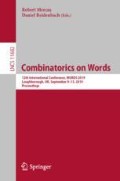Abstract
The problem of the commutative equivalence of semigroups generated by semi-linear languages is studied. In particular conditions ensuring that the Kleene closure of a bounded semi-linear code is commutatively equivalent to a regular language are investigated.
The research of F. D’Alessandro was partially supported by TUBITAK Project 2221 (Scientific and Technological Research Council of Turkey) and by the National Group for Algebraic and Geometric Structures, and their Applications (GNSAGA–INdAM).
Access this chapter
Tax calculation will be finalised at checkout
Purchases are for personal use only
References
Béal, M.-P., Perrin, D.: On the generating sequences of regular languages on \(k\) symbols. J. ACM 50, 955–980 (2003)
Boasson, L., Restivo, A.: Une Caractérisation des Langages Algébriques Bornés. ITA 11, 203–205 (1977)
Baron, G., Kuich, W.: The characterization of nonexpansive grammars by rational power series. Inf. Control 48, 109–118 (1981)
Berstel, J., Perrin, D., Reutenauer, C.: Codes and Automata Encyclopedia of Mathematics and its Applications, vol. 129. Cambridge University Press, Cambridge (2009)
Bridson, M.R., Gilman, R.H.: Context-free languages of sub-exponential growth. J. Comput. Syst. Sci. 64, 308–310 (1999)
Carpi, A., D’Alessandro, F.: On the commutative equivalence of context-free languages. In: Hoshi, M., Seki, S. (eds.) DLT 2018. LNCS, vol. 11088, pp. 169–181. Springer, Cham (2018). https://doi.org/10.1007/978-3-319-98654-8_14
Choffrut, C., D’Alessandro, F., Varricchio, S.: On bounded rational trace languages. Theory Comput. Syst. 46, 351–369 (2010)
Chomsky, N., Schützenberger, M.-P.: The algebraic theory of context-free languages. In: Braffort, P., Hirschberg, D. (eds.) Computer Programming and Formal Systems, pp. 118–161. North Holland Publishing Company, Amsterdam (1963)
D’Alessandro, F., Intrigila, B., Varricchio, S.: The Parikh counting functions of sparse context-free languages are quasi-polynomials. Theoret. Comput. Sci. 410, 5158–5181 (2009)
D’Alessandro, F., Intrigila, B., Varricchio, S.: Quasi-polynomials, linear Diophantine equations and semi-linear sets. Theoret. Comput. Sci. 416, 1–16 (2012)
D’Alessandro, F., Intrigila, B.: On the commutative equivalence of bounded context-free and regular languages: the code case. Theoret. Comput. Sci. 562, 304–319 (2015)
D’Alessandro, F., Intrigila, B.: On the commutative equivalence of semi-linear sets of \(\mathbb{N}^{k}\). Theoret. Comput. Sci. 562, 476–495 (2015)
D’Alessandro, F., Intrigila, B.: On the commutative equivalence of bounded context-free and regular languages: the semi-linear case. Theoret. Comput. Sci. 572, 1–24 (2015)
D’Alessandro, F., Ibarra, O.H., McQuillan, I.: On finite-index indexed grammars and their restrictions. In: Drewes, F., Martín-Vide, C., Truthe, B. (eds.) LATA 2017. LNCS, vol. 10168, pp. 287–298. Springer, Cham (2017). https://doi.org/10.1007/978-3-319-53733-7_21
de Luca, A., Varricchio, S.: Finiteness and Regularity in Semigroups and Formal Languages. Springer, Berlin (1999). https://doi.org/10.1007/978-3-642-59849-4
Eilenberg, S., Schützenberger, M.-P.: Rational sets in commutative monoids. J. Algebra 13, 173–191 (1969)
Flajolet, P.: Analytic models and ambiguity of context-free languages. Theoret. Comput. Sci. 49, 283–309 (1987)
Ginsburg, S., Spanier, E.H.: Semigroups, presburger formulas, and languages. Pacific J. Math. 16, 285–296 (1966)
Ginsburg, S.: The Mathematical Theory of Context-Free Languages. Mc Graw-Hill, New York (1966)
Gross, M.: Inherent ambiguity of minimal linear grammars. Inf. Control 7, 366–368 (1964)
Honkala, J.: Decision problems concerning thinness and slenderness of formal languages. Acta Inf. 35, 625–636 (1998)
Honkala, J.: On Parikh slender context-free languages. Theoret. Comput. Sci. 255, 667–677 (2001)
H.Ibarra, O., Ravikumar, B.: On sparseness, ambiguity and other decision problems for acceptors and transducers. In: Monien, B., Vidal-Naquet, G. (eds.) STACS 1986. LNCS, vol. 210, pp. 171–179. Springer, Heidelberg (1986). https://doi.org/10.1007/3-540-16078-7_74
Ibarra, O.H., McQuillan, I., Ravikumar, B.: On counting functions of languages. In: Hoshi, M., Seki, S. (eds.) DLT 2018. LNCS, vol. 11088, pp. 429–440. Springer, Cham (2018). https://doi.org/10.1007/978-3-319-98654-8_35
Ilie, L., Rozenberg, G., Salomaa, A.: A characterization of poly-slender context-free languages. RAIRO Inform. Théor. Appl. 34, 77–86 (2000)
Incitti, R.: The growth function of context-free languages. Theoret. Comput. Sci. 255, 601–605 (2001)
Latteux, M., Thierrin, G.: On bounded context-free languages. Elektron. Inform. Verarb. u. Kybern. 20, 3–8 (1984)
Restivo, A.: A characterization of bounded regular sets. In: Brakhage, H. (ed.) GI-Fachtagung 1975. LNCS, vol. 33, pp. 239–244. Springer, Heidelberg (1975). https://doi.org/10.1007/3-540-07407-4_26
Trofimov, V.I.: Growth functions of some classes of languages. Kibernetika (Kiev), (6), 9–12, 149 (1981)
Author information
Authors and Affiliations
Corresponding author
Editor information
Editors and Affiliations
Rights and permissions
Copyright information
© 2019 Springer Nature Switzerland AG
About this paper
Cite this paper
Carpi, A., D’Alessandro, F. (2019). On the Commutative Equivalence of Bounded Semi-linear Codes. In: Mercaş, R., Reidenbach, D. (eds) Combinatorics on Words. WORDS 2019. Lecture Notes in Computer Science(), vol 11682. Springer, Cham. https://doi.org/10.1007/978-3-030-28796-2_9
Download citation
DOI: https://doi.org/10.1007/978-3-030-28796-2_9
Published:
Publisher Name: Springer, Cham
Print ISBN: 978-3-030-28795-5
Online ISBN: 978-3-030-28796-2
eBook Packages: Computer ScienceComputer Science (R0)

